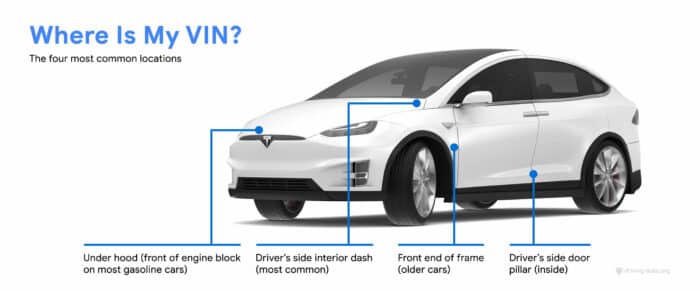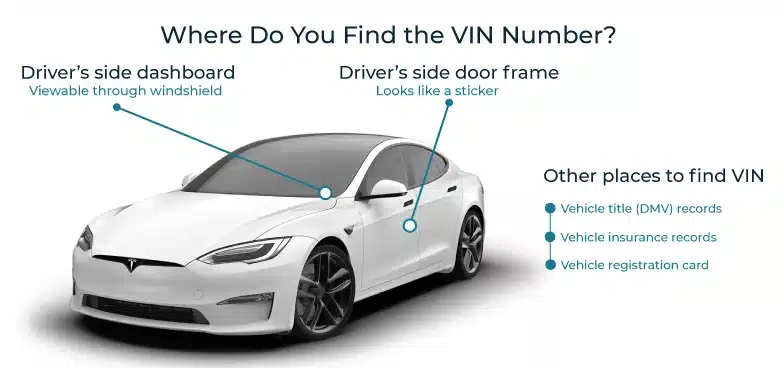Classic Car VIN Decoder: Free Pre-1980 VIN Lookup
Classic cars often have missing details. A Classic Car VIN decoder helps buyers and sellers know clearly about the car’s specs and history with a classic car history. Lookup classic VIN now to secure your transaction.
What is a Classic Car VIN Decoder?
The Classic Car VIN Decoder is a tool that helps you read and understand the Vehicle Identification Number (VIN) of older cars. Classic car VINs usually have 5 to 14 digits, which is shorter than the modern 17-digit VIN used today. Because every manufacturer used different systems before 1981, these VINs can be confusing without the right tool.
With a classic car VIN decoder, you can find important details such as:
The year the car was built.
The factory where it was made.
The original engine type.
The trim level or body style.
By using an old car VIN lookup, you can find key details such as the year the car was built, where it was made, the original engine, and the body style. You can also access more records, like accident history, title brand checks, odometer readings, recalls, and even past auction listings with photos.
Why VIN Decoding Matters for Classic Cars
With a classic VIN decoder, it can help you secure the best quality of a classic car that has never been stolen, has its VIN tampered with, or has even been recalled due to safety issues.
Here are more reasons why you should run Classic Car VIN Decoder before you purchase a classic car:
Avoid a Stolen Vehicle
The classic car VIN decoder helps you see if the vehicle was stolen to avoid getting in legal trouble. Even if you accidentally purchase a used vehicle and later find out that it was stolen, it can be seized by the authorities, and you will not get your money back.
Tampered VIN
A lot of used classic car sold in the market has it’s VINs tampered with to cover dark facts like the car was in an accident or even stolen. A classic car VIN decoder helps you find out if the VIN is correct and not tampered with.
Mismatched Parts
A vehicle report helps confirm if a classic car still has its original engine, transmission, and has its original parts intact. It helps you reveal mismatches that affect authenticity, value, and future investment.
See if the Vehicle Fits Your Needs
A vehicle history report by VIN shows the exact specifications, making it easier to decide if the vehicle matches your needs, style, and preferences.
Spot Fraudulent Vehicle
A vehicle report reveals hidden details and helps identify fraudulent listings, saving you from scams without needing a physical inspection.
Helps the Seller Set the Price Better
On the classic car history report, you will see the sales history of the car along with the price, as well as the records. With this information, sellers can set the price just right by calculating the RV sales price and matching it with its real condition.
How to Decode a Classic Car VIN: Step-by-Step Guide
To decode the classic car VIN, you just need to fill in the form above. Follow these instructions to get it done:
Step 1: Get the VIN
First of all, you need to find the VIN of the car you want to decode. You may ask the seller or find it on the vehicle’s paperwork.
Step 2: Fill in the Form
Click on the form above and write in the VIN. Then, click the button to submit the form.
Step 3: Get the Report
Wait for seconds for the report to be generated. Once it's done, you can get the classic history report.
Classic History Report Breakdown
If you plan to buy a classic car, it’s always recommended to decode the VIN and get the classic car history report. You can use our classic car history lookup to get it done all by yourself.
Here’s a snippet of the records that you will get on the classic car report:
Accident Records
Details from insurance companies, junkyards, and auctions reveal if the car was involved in collisions. See the date and the location where it happened.
Title History
Check if the vehicle carries branded titles such as salvage or rebuilt, which can affect condition and resale value.
Mileage History
Track odometer readings over time to confirm accurate mileage and detect possible rollbacks. See the last recorded mileage and the recorded mileage history.
Loan and Lien Records
See if the vehicle still has unpaid loans or liens reported by lenders, protecting you from unexpected financial obligations.
Theft Records
Find out whether the vehicle was ever reported stolen and check the date, location, and the data source of the vehicle.
Auction Records
Review auction listings and salvage records to better understand the car’s past condition and possible repairs. Auction records may include ten pictures that show the real condition of the car during the auction.
Where to Find the VIN on a Classic Car?
To find the classic VIN on the vehicle is almost the same as finding the VIN for a modern vehicle. Here are the locations where you can find the VIN on a classic vehicle:
- Dashboard (driver’s side): Usually stamped on a small plate and can be seen through the windshield.
- Driver’s Door Area: Check the door edge or the doorjamb for a factory-applied sticker.
- Engine Compartment: Some VIN plates are mounted in the bay alongside manufacturer codes and option details.
- Inside Cabin: Certain models may have the VIN marked on the firewall or beneath the steering column.
- Vehicle’s Paperwork: Check on the vehicle’s paperwork, like the registration or insurance papers, to find the VIN easily.

Who Should Use the Classic VIN Decoder?
A classic VIN decoder is useful for many people because it helps them understand the actual history and the specifications of used vehicles.
- Collectors: They use it to confirm the car’s originality and make sure no parts were changed. This helps keep the value high.
- Restorers: A VIN check guides restorers in finding the correct factory parts and details, making restoration more accurate and authentic.
- Buyers and Sellers: It builds trust in the sale by showing accident history, mileage, or title brands before money is exchanged.
- Museums: Museums use it to record rare vehicles with accurate data, ensuring cars on display match their historic background.
- Insurers: Insurance companies can assess the real condition, past issues, and market value before offering the best coverage for a classic car.
Always verify the classic car’s history before you make a purchase. Many classic cars have been restored, rebuilt, or even involved in accidents, and sellers don’t always share those details.
Decode Classic VIN Decoder by Manufacturer
Explore More Vehicle Lookup Tool
Customer Testimonial
This site is fantastic - I received the "original" window sticker for my vehicle! Great customer service as well - I had a small issue and "Richard Langridge" sorted it out right away! Thanks you - Thumbs up - will definitely use this site again!
Fast and cheap
Very Helpful
I reached out for help getting records on older cars, something I had struggled with for a long time. The team was extremely knowledgeable and walked me through every step. They found exactly what I needed, and their communication made the whole process stress-free. If you’re looking for trustworthy help with older car history, this is the place to go.
Uncover Hidden Risks
A Classic Car VIN Decoder can show the real story, including production year, factory details, and records. Decode the classic car and examine the records to protect your investment from scams.
FAQ About Classic VIN Decoder
Are there any accurate classic VIN decoders?
While there were not so many classic VIN decoder services, you can use our Classic Car VIN Decoder to decode the classic car VIN accurately and get the classic history report. All you need to do is just find the classic VIN and fill in the form above.
How to decode an 11 Digit VIN?
To decode the 11-digit VIN, you can use our Classic Car VIN Decoder. You just need to fill in the form above, click the button, and then you will be directed to the preview page; after that, you can proceed to the payment section to get the full report.
How do I decode a vintage VIN?
For older vehicles made before 1981, the VIN usually has 13 digits instead of 17. This number can tell a lot about the car, like where it was built, who made it, the year, engine type, and body style.
Is there a free VIN number check for old cars?
For an old car VIN lookup, you can use our pre-1980 VIN number search to uncover details about the vehicle’s history, including specs, theft records, salvage titles, recalls, odometer reading, auction history with real pictures, and the car’s value.
How to authenticate a classic car?
To check if a classic car is real, you should get a classic history report to help you look at its condition, review records like service and owner history, and make sure the main parts and VINs match the factory details.
Is there a Carfax for classic cars?
No, the Carfax report is not available for classic cars because Carfax only provides information from cars manufactured from 1981 onward, when the VIN was standardized to 17 digits.
How to identify a classic car?
Here is a simple way to know if a car is vintage, antique, or classic based on the year it was made:
- Vintage Car: Built between 1919 and 1930
- Antique Car: Made in 1975 or earlier (over 45 years old)
- Classic Car: Made in 2000 or earlier (over 20 years old)
How to inspect a classic car?
When checking a classic car, look for rust or damage on the body, under the car, and inside. Test the engine, brakes, and lights, and listen for strange sounds. Check the fluids for leaks, and take the car for a test drive.
Is a classic car cheaper to insure?
Yes, classic cars usually cost less to insure than modern cars. They are driven less and often kept in safe storage, so the risk of accident or theft is lower. Classic car insurance also works differently, as it uses an agreed value instead of market value, and it often comes with rules on how the car can be used and a need for another daily car.


